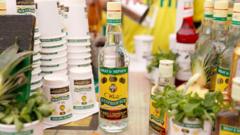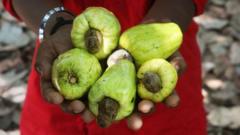The article delves into the ongoing tensions in the Jamaican rum industry as producers advocate for stricter regulations to safeguard the iconic designation of Jamaican rum. A recent amendment to the geographical indication (GI) guidelines disallows overseas aging, prompting a conflict among distillers. Supporters claim this is essential for preserving the rum's authenticity, while critics argue that such restrictions could threaten businesses reliant on international production methods.
What Defines Jamaican Rum? Legal Battle Unfolds Over Authenticity

What Defines Jamaican Rum? Legal Battle Unfolds Over Authenticity
A dispute in Jamaica raises crucial questions about what criteria must be met for rum to carry the esteemed label of "Jamaica rum".
Jamaica's rum is profoundly woven into its cultural tapestry, yet the question looms: what exactly makes a rum "Jamaican"? This inquiry sits at the center of a contentious legal dispute unfolding on the island, where local distillers are pushing for firmer rules governing the prestigious title of "Jamaica rum."
In October 2022, Jamaica's Intellectual Property Office (JIPO) introduced amendments to the geographical indication (GI) guidelines for Jamaican rum, initially established in 2016. A key update prohibits aging rum outside of Jamaica, sparked by demands from the Spirits Pool Association (SPA), which represents the interests of the island's main rum producers such as Appleton and Hampden Estate.
The association argues that a more robust GI is crucial for achieving official recognition in primary export markets like the EU and the US, promising better protection against competitors and enabling consumers to appreciate Jamaica rum as a premium offering steeped in tradition.
However, the changes have ignited a storm of controversy, particularly from National Rums of Jamaica (NRJ), a significant player that owns the Long Pond distillery and a large portion of Clarendon. NRJ challenges the JIPO amendment, claiming it may force them out of business. Their perspective is that aging rum abroad should still permit the product to be labeled as Jamaican, citing a long history of exporting and aging rum outside the island.
The NRJ's objections gained traction following its takeover by Maison Ferrand, a French entity which transformed its business model to focus primarily on overseas production. The SPA's management insists that if one genuinely believes in the merit of Jamaican rum, it should be aged within Jamaica.
Mr. Christopher Gentles from the SPA emphasizes the pivotal role aging plays in preserving authenticity. He asserts that allowing rum to be aged elsewhere undermines the product's distinctiveness while depriving Jamaica of economic benefits such as rum tourism.
In contrast, global experts like Professor Dev Gangjee from the University of Oxford point out that geographical indications not only enhance product value but also protect regional authenticity from losing its unique appeal. Successful examples include iconic products like Scotch whisky and French champagne, which command premium prices thanks to stringent geographic designations.
The rum dispute mirrors other regional conflicts, such as in Barbados, where distillers also face challenges stemming from the definition of what constitutes "local rum." The fight for clarity in geographical indications continues to be a critical issue for rum producers in both countries.
The SPA has hopes for Jamaican rum to secure EU's Protected Geographical Indication classification, contingent on the resolution of the JIPO proceedings. Gentles optimistically suggests that both parties might find a compromise that honors both business interests and the heritage of Jamaican rum.
Echoing sentiments from local media, many feel it is vital to protect the cultural integrity of Jamaican rum from foreign appropriation. The steadfast belief remains: Jamaican rum should remain a proudly authentic product, rooted deeply in the nation's identity.
In October 2022, Jamaica's Intellectual Property Office (JIPO) introduced amendments to the geographical indication (GI) guidelines for Jamaican rum, initially established in 2016. A key update prohibits aging rum outside of Jamaica, sparked by demands from the Spirits Pool Association (SPA), which represents the interests of the island's main rum producers such as Appleton and Hampden Estate.
The association argues that a more robust GI is crucial for achieving official recognition in primary export markets like the EU and the US, promising better protection against competitors and enabling consumers to appreciate Jamaica rum as a premium offering steeped in tradition.
However, the changes have ignited a storm of controversy, particularly from National Rums of Jamaica (NRJ), a significant player that owns the Long Pond distillery and a large portion of Clarendon. NRJ challenges the JIPO amendment, claiming it may force them out of business. Their perspective is that aging rum abroad should still permit the product to be labeled as Jamaican, citing a long history of exporting and aging rum outside the island.
The NRJ's objections gained traction following its takeover by Maison Ferrand, a French entity which transformed its business model to focus primarily on overseas production. The SPA's management insists that if one genuinely believes in the merit of Jamaican rum, it should be aged within Jamaica.
Mr. Christopher Gentles from the SPA emphasizes the pivotal role aging plays in preserving authenticity. He asserts that allowing rum to be aged elsewhere undermines the product's distinctiveness while depriving Jamaica of economic benefits such as rum tourism.
In contrast, global experts like Professor Dev Gangjee from the University of Oxford point out that geographical indications not only enhance product value but also protect regional authenticity from losing its unique appeal. Successful examples include iconic products like Scotch whisky and French champagne, which command premium prices thanks to stringent geographic designations.
The rum dispute mirrors other regional conflicts, such as in Barbados, where distillers also face challenges stemming from the definition of what constitutes "local rum." The fight for clarity in geographical indications continues to be a critical issue for rum producers in both countries.
The SPA has hopes for Jamaican rum to secure EU's Protected Geographical Indication classification, contingent on the resolution of the JIPO proceedings. Gentles optimistically suggests that both parties might find a compromise that honors both business interests and the heritage of Jamaican rum.
Echoing sentiments from local media, many feel it is vital to protect the cultural integrity of Jamaican rum from foreign appropriation. The steadfast belief remains: Jamaican rum should remain a proudly authentic product, rooted deeply in the nation's identity.




















